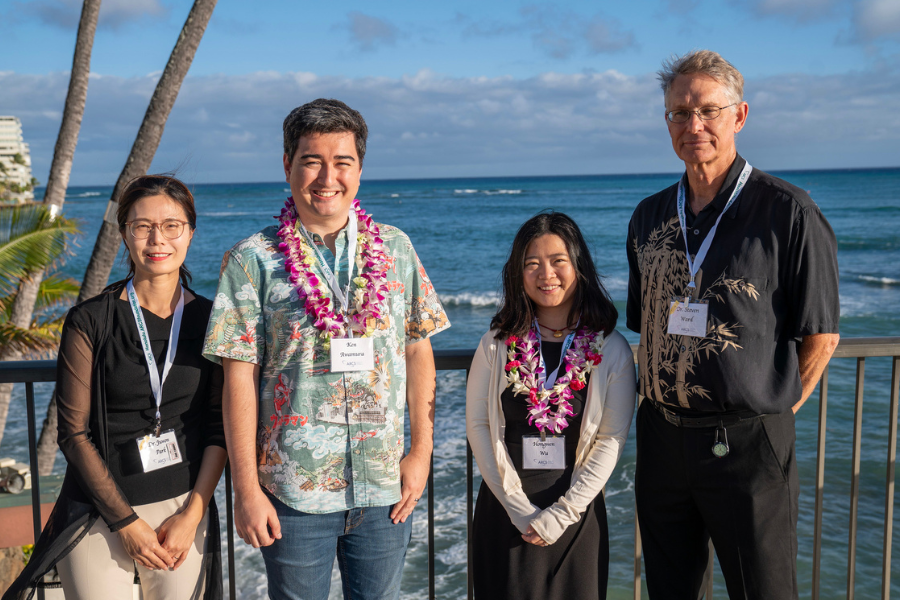JABSOM News, May 14, 2024, by Matthew Campbell

It was a special night at the Elks Lodge on May 6, 2024, as two John A. Burns School of Medicine graduate students were recognized by Honolulu’s chapter of the Achievement Rewards for College Scientists (ARCS) Foundation for their accomplishments in doing vital, high-impact research.
Ken Awamura and Hongwen Wu are conducting research that will have a meaningful impact on the people of Hawaiʻi and beyond. They received their awards at the annual ARCS banquet. In addition to the two JABSOM graduate students being honored, Alika Maunakea, PhD, was named 2024 ARCS Scientist of the Year.
Here’s a closer look at each graduate student’s work:
Hongwen Wu’s research explores pregnancies and having a healthy pregnancy. At the John A. Burns School of Medicine’s Institute for Biogenesis Research, Wu and her advisor, Dr. Steven Ward, are studying a genetic component of folliculogenesis, egg quality, and ovarian aging.
“We think this is very interesting because we might provide a model to study premature ovarian failure,” Wu said. “Studying this mechanism may provide some insight into infertility and IVF outcomes.”
Wu uses knockout mice with one or more genes turned off to investigate how ovarian failure can translate to humans.
“Our knockout mice had a very early oocyte depletion phenotype, which means they showed a premature ovarian failure phenotype at a very early age,” Wu explained. We found out this knockout model is involved in follicular genesis, and that’s why we carried on this project.”
Wu’s dissertation will cover this topic, and she received the ARCS Foundation Honolulu Award in Medicine.
“I just feel very honored and am very happy and grateful for all the support my lab gives me. They nominated me for this award, and I am very proud and honored to be here with them when I receive it,” Wu said.
Ken Awamura is researching the effects of the diabetes drug metformin on the immune cell population of patients living with HIV.
As people with HIV are now living longer due to improved treatment, there is a growing need to address age-related comorbidities that are emerging in this population.
Studies show patients living with HIV are experiencing cardiovascular disease, neurocognitive impairment, cancer, and diabetes at higher rates and younger ages than non-infected individuals.
“The goal is to decrease the incidence rate of these certain age-related comorbidities,” Awamura said. We believe that metformin might be a piece of that puzzle. For those who are already taking metformin, there might actually be some additional beneficial effects of taking that medication.”
Working under the guidance of Dr. Juwon Park, Awamura received the Guy Moulton Yates ARCS Award in Medicine. He shares the honor of being an ARCS Scholar with his fiancée, Katie Lee.
“It is really nice,” Awamura said. She got it two years ago, so it’s kind of nice being in the same position, being able to see eye to eye equally. That’s really what drove me to want to do this in the first place.”
The night began with Alika Maunakea, PhD, named 2024 ARCS Scientist of the Year.
Maunakea is a leading epigeneticist who seeks to understand the gene-environment interactions that underlie the development of diseases of health disparities.
After completing his undergraduate studies at Creighton University and graduate studies at the University of California San Francisco, Dr. Maunakea is back home conducting research that will impact the Native Hawaiian community.
“I came home to do exactly that,” Maunakea said. “I could not do this remotely. It means a big difference to people when you are from Hawaiʻi and doing the work here locally and growing our own. We are inspiring and trying to promote workforce development in our population and getting them to understand the value of the kind of work that we do and also be able to contribute with their own cultural knowledge and community knowledge to support those types of efforts, especially as we try to address the persistent health issues in our community.”
The ARCS Foundation has advanced science and technology across the United States since its formation in 1958. The Honolulu Chapter has contributed to science in Hawaiʻi for the last five decades. Through generous financial awards given to academically outstanding U.S. graduate students studying to complete degrees in science, engineering, math, technology, and medical research at the University of Hawai’i, ARCS has paved the way for homegrown researchers to make breakthroughs that impact our communities. Of all University of Hawaiʻi units, JABSOM has the most ARCS Scholars.
“I think it is a great honor, especially from my humble beginnings growing up in Nanakuli in a multigenerational household where I was inspired by my family and their work in the community,” Dr. Maunakea said. This award is just part of their legacy and all of the mentors and supporters that I met along the way. It is not just honoring me personally, but I think it is really about the work that we’re doing and the origins of all that.”
